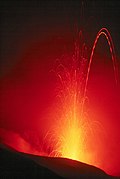Volcanology
Volcanology is the scientific study of volcanoes and volcanic phenomena. The field is a sub-discipline of geology, the study of the Earth's solid materials, including rocks and minerals.
History[edit]
The study of volcanoes has been a focus of human curiosity for centuries. The term "volcanology" is derived from Vulcan, the ancient Roman god of fire. Early observations and interpretations of volcanic activity were primarily descriptive and often tied to mythology. Modern volcanology began in the 19th century and was further developed in the 20th century with the advent of new technology and techniques.
Branches of Volcanology[edit]
Volcanology is a broad field that encompasses many different areas of study. These include:
- Physical Volcanology: This branch focuses on the physical processes and mechanisms of volcanic activity. This includes the study of eruption dynamics, lava flows, pyroclastic flows, and volcanic gases.
- Geochemistry of Volcanoes: This branch involves the study of the chemical composition of volcanic rocks and gases to understand the processes occurring beneath the Earth's surface that lead to volcanic eruptions.
- Volcano Geophysics: This branch uses geophysical methods, such as seismicity and ground deformation, to study the internal structure of volcanoes and the processes leading to eruptions.
- Volcanic Hazards: This branch focuses on understanding and predicting volcanic hazards, such as eruptions, lahars, and volcanic ash clouds, to mitigate their impact on human societies and the environment.
Volcanic Features[edit]
Volcanic features are diverse and include:
- Volcano: A volcano is a rupture in the Earth's crust where molten rock, debris, and gases escape to the surface.
- Crater: A crater is a bowl-shaped depression at the top of a volcano, typically formed by an eruption.
- Caldera: A caldera is a large, usually circular depression formed when a volcano erupts and collapses.
- Lava Dome: A lava dome is a mound-shaped protrusion resulting from the slow extrusion of viscous lava from a volcano.
Notable Volcanologists[edit]
- Haroun Tazieff: A French volcanologist known for his extensive fieldwork and his work in popularizing the field.
- Katia and Maurice Krafft: A French couple who were pioneers in filming, photographing and recording volcanoes. They died during a pyroclastic flow on Mount Unzen in Japan in 1991.
- George P. L. Walker: A British volcanologist who made significant contributions to the understanding of volcanic processes and hazards.
See Also[edit]
This article is a geology stub. You can help WikiMD by expanding it!
-
Sampling lava with hammer and bucket
-
Stromboli Eruption
-
Destructive plate margin
-
Vesuvius 1822 by Scrope
-
Mount St. Helens eruption plume, July 22, 1980
-
Pele's hair on antenna
-
Volcan Pacaya, Guatemala, 1775
Ad. Transform your life with W8MD's Budget GLP-1 injections from $75


W8MD offers a medical weight loss program to lose weight in Philadelphia. Our physician-supervised medical weight loss provides:
- Weight loss injections in NYC (generic and brand names):
- Zepbound / Mounjaro, Wegovy / Ozempic, Saxenda
- Most insurances accepted or discounted self-pay rates. We will obtain insurance prior authorizations if needed.
- Generic GLP1 weight loss injections from $75 for the starting dose.
- Also offer prescription weight loss medications including Phentermine, Qsymia, Diethylpropion, Contrave etc.
NYC weight loss doctor appointmentsNYC weight loss doctor appointments
Start your NYC weight loss journey today at our NYC medical weight loss and Philadelphia medical weight loss clinics.
- Call 718-946-5500 to lose weight in NYC or for medical weight loss in Philadelphia 215-676-2334.
- Tags:NYC medical weight loss, Philadelphia lose weight Zepbound NYC, Budget GLP1 weight loss injections, Wegovy Philadelphia, Wegovy NYC, Philadelphia medical weight loss, Brookly weight loss and Wegovy NYC
|
WikiMD's Wellness Encyclopedia |
| Let Food Be Thy Medicine Medicine Thy Food - Hippocrates |
Medical Disclaimer: WikiMD is not a substitute for professional medical advice. The information on WikiMD is provided as an information resource only, may be incorrect, outdated or misleading, and is not to be used or relied on for any diagnostic or treatment purposes. Please consult your health care provider before making any healthcare decisions or for guidance about a specific medical condition. WikiMD expressly disclaims responsibility, and shall have no liability, for any damages, loss, injury, or liability whatsoever suffered as a result of your reliance on the information contained in this site. By visiting this site you agree to the foregoing terms and conditions, which may from time to time be changed or supplemented by WikiMD. If you do not agree to the foregoing terms and conditions, you should not enter or use this site. See full disclaimer.
Credits:Most images are courtesy of Wikimedia commons, and templates, categories Wikipedia, licensed under CC BY SA or similar.
Translate this page: - East Asian
中文,
日本,
한국어,
South Asian
हिन्दी,
தமிழ்,
తెలుగు,
Urdu,
ಕನ್ನಡ,
Southeast Asian
Indonesian,
Vietnamese,
Thai,
မြန်မာဘာသာ,
বাংলা
European
español,
Deutsch,
français,
Greek,
português do Brasil,
polski,
română,
русский,
Nederlands,
norsk,
svenska,
suomi,
Italian
Middle Eastern & African
عربى,
Turkish,
Persian,
Hebrew,
Afrikaans,
isiZulu,
Kiswahili,
Other
Bulgarian,
Hungarian,
Czech,
Swedish,
മലയാളം,
मराठी,
ਪੰਜਾਬੀ,
ગુજરાતી,
Portuguese,
Ukrainian





